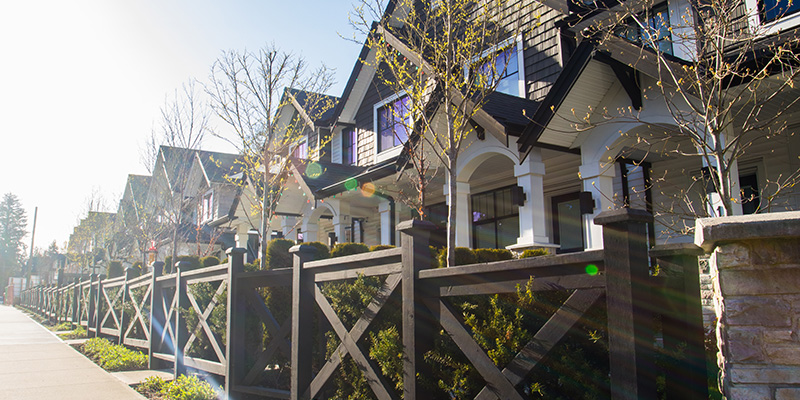Should You Live In A Deed Restricted Community?

There are a number of critical steps you must take before buying a home, and one of those is to find out whether the property belongs in a deed-restricted neighborhood. But, what is a deed-restricted community anyway? And how does it affect you as a potential homeowner?
Browse By Category
Sign up for Our Newsletter
There are a number of critical steps you must take before buying a home, and one of those is to find out whether the property belongs in a deed-restricted neighborhood. But, what is a deed-restricted community anyway? And how does it affect you as a potential homeowner?
What Does It Mean to Live in a Deed-Restricted Community?
What does deed-restricted community mean? To put it plainly, a deed-restricted community is a complex or development where homeowners can’t do certain actions. Such communities are typically governed by a private entity known as homeowners associations. These associations follow a set of governing documents, which includes the Declaration of Covenants, Conditions, & Restrictions (CC&Rs).
What is a deed restriction? Otherwise known as restrictive covenants in HOAs, these are agreements that limit or prohibit certain activities typically involving the property use, maintenance, and appearance. So, what does it mean when a property is deed-restricted? Simply put, it means you must adhere to certain rules and covenants restricting how you use that property.
Deed restrictions typically run with the land. That means they are attached to the land itself and not the home on top of it. Many deed restrictions also come from homeowners associations. For this article, we will be focusing on the HOA deed restrictions.
Common Deed Restrictions in HOAs
 What is an example of a deed restriction? Although deed restrictions are very common in HOA communities, not all associations have the same exact set. Some of the most common restrictive covenants you might come across, though, include but are not limited to:
What is an example of a deed restriction? Although deed restrictions are very common in HOA communities, not all associations have the same exact set. Some of the most common restrictive covenants you might come across, though, include but are not limited to:
- The exterior appearance of your property such as what paint colors and finishes you can use, doors you can install, etc.
- Structural additions or modifications to your property such as sheds, greenhouses, balconies, pools, etc.
- Fencing requirements and limitations
- Vehicle parking such as where you can park, what type of vehicles you can park in your driveway or street, etc.
- Landscaping requirements and limitations
- Hanging your laundry out to dry*
- Satellite dish, antenna, or solar panel installations*
- Custom mailbox designs
- Prohibiting or regulating the use of your property as a business
- Pet policies such as how many pets you can have, what types, and what breed
- Age restrictions such as only allowing residents 55 years or older
- Placement of trash cans
*In some states, HOAs cannot prohibit homeowners from solar drying and the installation of satellites, antennas, and solar panels. Though, they may be able to regulate them.
Pros and Cons of a Deed-Restricted Community
Living in a community with deed restrictions obviously has both advantages and disadvantages. As a potential homeowner, you need to weigh these two against each other to determine whether or not living in a deed-restricted community is right for you.
Benefits of a Deed-Restricted Community
Here are the benefits of living in a community with HOA deed restrictions:
- Access to Amenities. Many deed-restricted communities come with several amenities and facilities that members can use. This can include pools, gyms, parks, and clubhouses. Access to these amenities is usually reserved for members only.
- Dispute Resolution. When you get into a spat with your neighbor, homeowners associations can step in and help with dispute resolution. Deed restrictions also mean that you won’t have to worry about your neighbor painting their house bright neon pink or their overhanging trees creeping on your property line.
- Maintenance. No time for landscaping maintenance or snow removal? Some associations provide such services as part of your monthly membership dues. Continuous maintenance of common areas can also lead to better aesthetics.
- Curb Appeal. One of the reasons deed restrictions exist is to facilitate uniformity. Even though the houses in the neighborhood more or less look the same way, consistency does enhance curb appeal.
- Property Values. All of the above benefits are great on their own. But, when you put them all together, it can lead to improved property values. And isn’t that what you want as a homeowner?
Drawbacks of a Deed-Restricted Community
Here are the drawbacks of living in a community with HOA restrictions:
- Limited Freedom. Because of restrictive covenants, you generally have limited freedom when it comes to how you can use or change your property. Some associations also require homeowners to mow their lawns and trim their trees on a regular basis, though it usually depends on what services the HOA provides.
- Monthly Dues. Homeowners who live in deed-restricted communities must pay monthly dues. These dues go straight to paying for the various expenses related to maintaining the community. Over time, these dues can increase, though there are certain limitations on how much associations can raise dues by every year.
- Potential for Consequences. To encourage compliance and prevent violations, HOAs do impose penalties — monetary or otherwise — when homeowners go against deed restrictions. In some cases, associations can even foreclose on your home.
- More Difficult to Sell. There are a couple of reasons why it would be harder for you to sell a deed-restricted property. First, people don’t tend to like it when they have limited freedom, so they are less likely to consider buying homes with deed restrictions. Second, some restrictions might limit your pool of potential buyers. For instance, if your HOA has age restrictions, that means you can only sell to people of a certain age.
Are Deed-Restricted Communities Worth It?
Homeowners tend to place significance on HOA dues more than anything else. After all, agreeing to live in an HOA community means having to pay these dues for as long as you are a member. If you stay for the next decade and need to pay $300 every month, that equates to $36,000 — and that doesn’t even factor in dues increases (which are practically inevitable).
All things considered, are HOA fees worth it? Most people would say yes. Thanks to regular neighborhood maintenance, homes in HOA communities are likelier to maintain their value over a longer period of time. Additionally, like it or not, the way your neighbor’s house looks can also affect the value of your home. When you examine the pros and cons, the former definitely outweighs the latter.
Who Creates Deed Restrictions on a Property?
Within the context of HOAs, the developer of the planned community usually establishes the first deed restrictions. After control is passed on to the homeowners association, more deed restrictions can then be created and added to the governing documents. Creating and amending deed restrictions, though, usually involves a lot of work.
The HOA board will first need to review and discuss a proposal of the addition or change. Homeowners can also provide their input during the meeting. Then, voting takes place. For many associations, passing an amendment requires a majority vote from the entire membership. This process can vary, though, from association to association. To learn more about your guidelines for amending deed restrictions, check your governing documents.
How Do I Find Deed Restrictions on My Property?
Some homeowners live for years on end without knowing their property is deed-restricted. This is why it is important to learn how to find deed restrictions on a property.
Such restrictions should appear within your property’s deed. If you can’t find your deed, you can ask for a copy of it from the recorder’s office where it was first filed. The process for how to find out deed restrictions can often take a long time, though, since they usually consist of hundreds of pages.
If you have yet to buy a home and wish to find out whether it is deed-restricted, your first course of action should be to check with your real estate agent. You can also conduct a title search or speak directly with the HOA as many deed restrictions do come from these associations.
Who Enforces a Deed Restriction?
The body that enforces deed restrictions is usually the body that created them in the first place. It may be the local government or the developer of the property. Who enforces deed restrictions in an HOA? If the property belongs in an HOA community, the HOA enforces the deed restrictions.
The HOA usually enforces deed restrictions by conducting regular inspections of the properties in the community. Since many restrictions have to do with architectural changes, HOAs usually have members follow an application and approval process. In larger associations, there are Architectural Control Committees that handle this type of thing.
What Happens If You Don’t Follow Deed Restrictions?
 In homeowners associations, when you fail to follow deed restrictions, it can lead to a number of possible consequences. These can differ depending on the HOA, though you can expect most to start with sending a notice of the violation. The HOA may also issue a fine against you after going through a disciplinary hearing.
In homeowners associations, when you fail to follow deed restrictions, it can lead to a number of possible consequences. These can differ depending on the HOA, though you can expect most to start with sending a notice of the violation. The HOA may also issue a fine against you after going through a disciplinary hearing.
Depending on state laws and the extent of the HOA’s authority, the association may also place a lien on your property. This will make it difficult for you to sell your home, especially when you have unpaid fees. Some associations can even foreclose on the lien.
What happens if you break a deed restriction in a non-HOA environment? Typically, the developer will initiate a lawsuit against the property owner. Lawsuits can be very expensive. Moreover, if you lose, you might have to pay for the developer’s legal fees as well.
How to Fight Deed Restrictions
How do I get around deed restrictions? Short of selling the property and moving out, there is really nothing you can do to fight deed restrictions. In HOAs, you may be able to change deed restrictions by going through the process spelled out within the governing documents.
But, there are certain exceptions. Some deed restrictions may not be enforceable if they are illegal, unreasonable, or outdated. Discriminatory deed restrictions, for one, are downright unconstitutional. The Fair Housing Act and state Fair Housing laws protect certain classes of individuals. For instance, a deed restriction that says you can’t sell the property to non-whites is illegal and unenforceable.
Make sure to check federal and state laws to ensure the deed restrictions on your property are legal and enforceable. Similarly, HOAs should remain up-to-date on these laws to avoid potential liability.
How Long Are Deed Restrictions Good For?
Deed restrictions can vary in terms of lifespan. Some only go on for 25 to 30 years, while others can last 30 to 45 years. Certain deed restrictions also restart the clock every time the property changes ownership. There are even deed restrictions that exist in perpetuity, meaning they have no expiry date.
When deed restrictions expire, they are no longer enforceable. In homeowners associations, though, there are cases where deed restrictions can be reinstated after expiry. This usually requires a majority vote from the membership, but it really all comes down to what it says in your governing documents.
The Rising Popularity of Deed-Restricted Communities
More and more people are choosing to buy homes in a deed-restricted community. Considering the benefits of such properties, this growing popularity does not come as much of a surprise. Although some HOA fees can be quite expensive, there is no denying that they come with a lot of perks in exchange. If you think of deed restrictions as guidelines to help boost property value, then they are definitely worth it.
Most deed-restricted communities are run by a set of board members with the help of an HOA management company. Our online directory makes it easy to look for management companies and vendors in your area. Start using it today!
RELATED ARTICLES:
- 25 Important HOA Policies The Board Should Think About
- 6 Benefits Of HOA Living
- 11 Things To Know Before Moving Into An HOA Community
Trending Now
Related Article
Sign up for Our Monthly Newsletter
Sign up below for monthly updates on all HOA Resource















